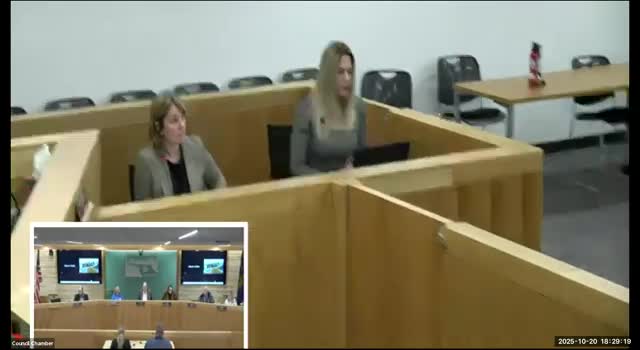Council pauses decision on Flock ALPR program after extended public concerns
Get AI-powered insights, summaries, and transcripts
Subscribe
Summary
After a multi-hour work session and public testimony, Springfield city leaders asked police and staff to return with narrower options and safeguards for the Flock automated license-plate recognition (ALPR) system; no vote was taken to activate or cancel the system.
SPRINGFIELD — Springfield officials heard more than an hour of presentation, council questions and public testimony on the city’s Flock automated license‑plate reader (ALPR) system on Monday, and chose not to vote on activation. Instead, council members asked police and staff to return with a narrowed set of implementation options and added safeguards.
Chief Rush of the Springfield Police Department told the council the presentation was intended to “address the concerns raised by members of our community, highlight the benefits of ALPR technology and reaffirm that this discussion is not about choosing between technology and community, but rather is it an opportunity for us to work together to develop strong, trusted, and accountable practices.” The chief and police tactical analyst, Brian Austin, described ALPR as a targeted investigative tool rather than a video surveillance system: “Automated license plate readers capture still images of vehicles traveling on public roadways. They are not video cameras.”
The police and their vendor representatives emphasized uses they say have produced results in other jurisdictions — locating missing persons, recovering stolen vehicles, and aiding investigations of organized retail theft — and stressed the system is grant funded, not paid from the city’s general fund. The police said the network consists of 25 cameras placed at high‑traffic entry points and retail corridors, and that camera captures are encrypted, stored on Amazon Web Services and automatically deleted after 30 days.
Public commenters, including resident Terry Pratt and Eyes Off Eugene/Springfield spokesperson Elliot Harwell, urged councilors to cancel the program. Pratt urged the council to “remove the block cameras from Springfield, please.” Harwell said the system “would be putting a tool in dangerous hands,” adding that a private company’s role and data‑sharing practices made him wary.
Representatives from Flock Safety said the company does not sell customer data. Trevor Chandler, director of public affairs for Flock Safety, told the council: “Flock does not sell data, period. Period.” The chief and staff also said the city retains ownership of its data and that the contract includes limits on commercial reuse; police staff warned that deactivation of a contract could have grant consequences.
Councilors pressed for written limits and oversight. Questions focused on who can request searches, whether private entities may access city captures, what audit logs look like, the 30‑day retention period, and the scope of any interagency sharing. Police staff described filters the department said had been added to block searches related to immigration enforcement or reproductive‑health investigations and said sharing could be limited to specific jurisdictions or to requests tied to case numbers or CAD (computer aided dispatch) numbers.
Several councilors expressed continued concern. Councilor Rodley said he was “furious” at the idea that search filters could be changed and asked for explicit policy safeguards. Councilor Stout said his “real hesitation” lay with sharing data with other agencies and asked for tracking of every search request originating from outside the city. Councilor Blackwell said public opposition made her pause before endorsing the system. Councilor Bradley said she wanted to protect and build trust with the community while balancing public‑safety benefits.
City staff said the cameras are installed but not operational and that council direction was needed. City Manager Newton and staff indicated they would work with the police chief to draft policy options. The council asked staff to return at a regular session with a “smallest step that yields the highest value” — examples mentioned included shortening retention from 30 days, limiting sharing to Lane County agencies or a smaller regional network, requiring case or CAD numbers for external search requests, and explicitly prohibiting reciprocal sharing to private entities. Several councilors said they would support a narrower, more local sharing arrangement or reduced retention if clear audit and oversight rules were adopted; others said they remain inclined to remove the system.
Next steps: staff and the police chief will return to the council with written options and recommended guardrails for the council to consider at a regular session. No motion to activate or cancel the system was taken Monday.
